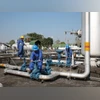State-owned exploration and production company Oil India Limited (OIL) is targeting the drilling of more than 75 wells during the ongoing financial year (FY25), as part of its new drilling program, OIL Chairman and Managing Director (CMD) Ranjit Rath said on Saturday.
The company had drilled 38, 45, and 61 wells in the last-three years, respectively, Rath said at a post-AGM press conference here.
“From 45 to 61 wells, it represents a 35 per cent annual growth. Also, this represents not only the number of wells but deeper and more complex wells,” Rath said.
“In the last two years, we have been growing at 5-6 per cent in terms of crude oil and natural gas production. This is on top of a natural decline (in existing production) of 12 per cent. So, the net growth is 6 per cent, gross growth is 18 per cent," Rath said.
OIL currently has a target to produce 4 million metric tonnes of crude oil per year.
Also Read
“The Assam shelf comprises huge stacks of sand reservoirs. The south bank of the Brahmaputra River provides us enough opportunity to explore, and produce," Rath said.
In the region, OIL is the only player which has attempted through a near-surface exploration program within the petroleum mining lease. It is using multilateral wells, radial drilling and extended reach drilling techniques, for which high powered drilling rigs are required.
“We continue to maintain the reserve-replace ratio at more or less one," Rath said.
He added the company is producing oil and gas from deeper wells, at average depths of 3000-4500 metres, much below the 2000-3500 metres depth earlier. As a result, the company has prioritised getting access to rigs.
“In a first, we evaluated a seven-rig bid in just 48 hours, to have a turnaround. If we don't have rig count, we can't have deep exploration and development," he stressed.
The company needs more rigs for wells such as one where it plans to dig down to 6,500 metre, the deepest in the north eastern part of the country.
The company is studying the possibility of permanent carbon sequestration in its oil fields in Rajasthan.
NRL expansion
The ongoing unrest in Bangladesh has also not slowed the process of the ongoing expansion of the Numaligarh refinery, Rath said.
The company is targeting the commissioning of the expanded Numaligarh Refinery by December, 2025. To construct a refinery in Numaligarh, a lot of overdimensioned cargo needs to be shipped. Cargo is currently being shipped from the Haldia port in West Bengal, following the riverine flow along the international water treaty-based boundary to the Brahmaputra River, and then into a tributary river called Dhansiri before it reaches the refinery site.
The 3 metric tonnes per annum (MMTPA) refinery in Upper Assam is undergoing a major capacity augmentation to 9 MMTPA by installing a 6 MMTPA capacity refinery and associated crude oil terminals and pipeline considering processing of Arab Light(AL) and Arab Heavy (AH) crude oil. The project also includes a 1,635 km crude oil trunk line from the Paradip port in Odisha to Numaligarh in Upper Assam, to transport 5.5 million tonnes of crude.
Both the projects are integrated and will be completed as part of a staged mechanical completion and staged pre-commissioning process, Rath said. Full scale production will take place in FY27 (2026-27).
On the other hand, while the 130-km-long Indo-Bangla Friendship Pipeline (IBFPL) pipeline continues to carry high speed diesel from Numaligarh Refinery Limited (NRL) in Assam to Bangladesh, only 4,000-odd tonnes of crude is currently moving in the 1 million tonne capacity pipeline, Rath said.

)